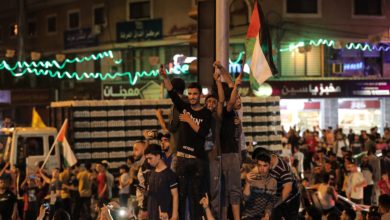On April 6, Egyptian security
forces blocked the streets of downtown Cairo in an attempt to prevent
pro-reform and pro-democracy protesters holding a rally. The rally was called
by the April 6 Movement to condemn renewal of the emergency law put into place
after the assassination of President Anwar Sadat in 1981.
 Cairo protest, April 6, 2010 |
The rally was held in front of the
Shura Council (the upper house of parliament), where the renewal bill would be
passed. Egyptian security forces pushed demonstrators into a corner before
beating and kicking them as they sought to get to Tahrir Square, the main
square in central Cairo. Others were hit by clubs and threatened with knives by
plain clothes police. The Egyptian police took cameras as well as cell phones
with cameras from news journalists. More than 90 protesters were detained.
Students also demonstrated at Cairo
University, according to Al-Jazeera, but the university gates were sealed so demonstrators
couldn‘t get into the street.
The main political demand was to
draw attention to the renewal of the emergency law under its new name, “The
anti–terrorism law.” The parliament is said to have initially approved the new
bill, which had been called for by President Hosni Mubarak in May 2008.
According to the Egyptian news agency Al Masry El Youn, government spokesperson
Magdy Rady refused to confirm the renewal of the law, saying, “The announcement
will happen when it happens.”
The April 6 Movement is a
pro-reform, direct-action and blog-based group that was formed in 2008 in
solidarity with the Egyptian cotton workers in the Delta area. Following its
founding, the movement has continued to grow.
Several Egyptian and international
NGOS have put the number of detainees held under the emergency law at between
12,000 and 14,000. The law allows the arrest of activists to prevent them from
organizing and allows torture of activists as well as journalists.
The law also allows the banning of
opposition political parties such as the Muslim Brotherhood—the largest
opposition movement. Another violation of human rights is the use of military
courts for activists and political opposition figures and imprisonment without
trial.
Egypt is the second largest
recipient of U.S. financial aid after Israel, which comes to $2 billion every
year. This aid aims to keep Egypt in the American sphere and, along with the
emergency law, prevent the rise of any progressive movement.





